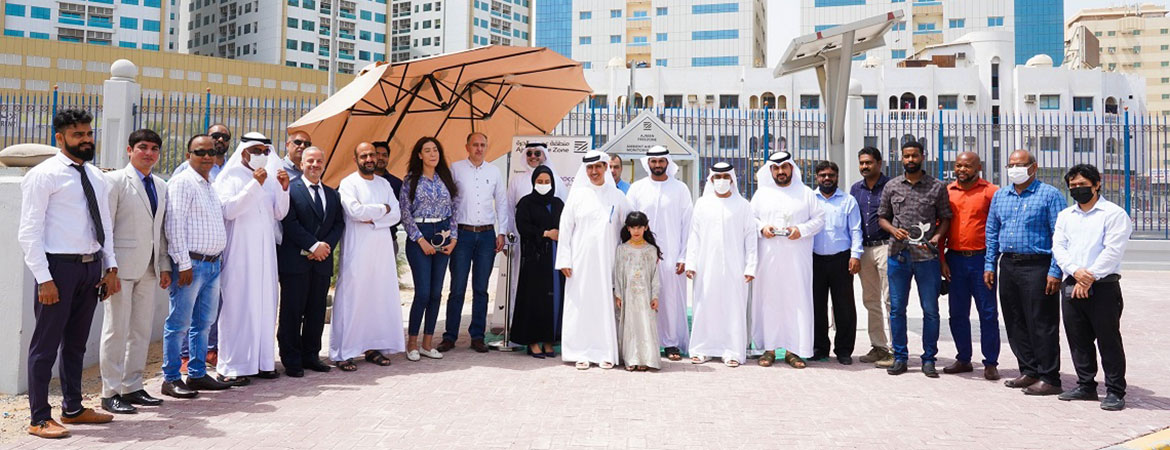Stepping up its sustainability initiatives and in support of climate actions in the country, Ajman Free Zone, in partnership with the Municipality and Planning Department of Ajman, has installed an ambient air quality monitoring system in Gate 2 of its industrial area. Gate 2 is the free zone’s chemical cluster dedicated to companies that operate chemical, tobacco, and oil and gas businesses.
The project saw the free zone deploying the high-techairSense technology to measure and assess the pollution levels of the industrial area based on existing international standards. The state-of-the-art tool can detect typical air pollutants such as O3, SO2, NO2, CO, CO2, VOC, formaldehyde, and NH3, in addition to PM1, PM2.5, PM4, PM10 and TSP.
Ajman Free Zone has formed a technical team to produce reports according to the data gathered by the real-time ambient air quality monitoring system. It will coordinate the findings with the Municipality and Planning Department of Ajman for process improvement and proper implementation of protocols. In case an industrial company has exceeded the acceptable levels, the free zone and the municipality will collaborate with the concerned entity to bring down the levels.
In addition, the installation complements Ajman Free Zone’s sustainability initiatives launched in line with UAE Energy Strategy 2050 and the United Nations’ Sustainable Development Goals (SDGs) 2030.
H.E. Eng. Ali AlSuwaidi, Director General of Ajman Free Zone, said: “The project is part of our overarching strategy to reduce our carbon emissions and help monitor air quality. The use of an ambient air quality monitoring system is one of the innovative ways to help reverse the impact of climate change and advance the sustainability goals of Ajman and the UAE. It also helps address the growing problem of air pollution that has detrimental effects on the people and our society.”
The move reflects a commitment to UAE Energy Strategy 2050 and SDGs 2030
“We would like to thank the Municipality and Planning Department of Ajman for collaborating with us in this initiative. We also extend our thanks to the business partners who have provided the device as a 24-hour air quality control system, thus reflecting their environmental awareness and social commitment. This initiative is part of Ajman Free Zone’s commitment to community responsibility as we seek to strengthen our sustainability approach, reduce our environmental impacts, and chart our path towards a sustainable business performance aligned with the country’s sustainability objectives and SDGs. The installation of the new system is a strong boost to our climate protection endeavours, which we plan to eventually replicate in other areas of our community. We look forward to implementing more similar programs in the future,”AlSuwaidi added.
For his part, Eng. Khalid Moeen Al Hosani, Department Executive Director of the Public Health and Environment Sector, the Municipality and Planning Department of Ajman, said: “Enhancing the quality of air is a strategic objective for the department, as air purity is one of the most necessary requirements for creating and sustaining a healthy, prosperous, and happy society. The department seeks to communicate with relevant authorities to ensure the strict application of laws that address the causes of air pollution, which has turned into a serious global issue, in addition to implementing measures to ensure that all sectors of our society comply with the relevant provisions.”
Al Hosani welcomed the Ajman Free Zone initiative, which will provide the required momentum, and incentivise other authorities and institutions to initiate similar measures and actions. Companies operating in the free zone and their employees will remain the main beneficiaries of this technology, as it will positively affect the health and productivity of the workforce, thus increasing profitability and reducing business costs, while protecting the environment at the same time.
This latest development is a testament to the free zone’s commitment to contribute to climate change mitigation strategy and comply with relevant laws and regulations in the country such as Federal Law No. 24 of 1999 (Protection and Development of the Environment) and Federal Cabinet of Ministers Decree No.12 of 2006 (Air pollution quality criteria for reference pollutants).
